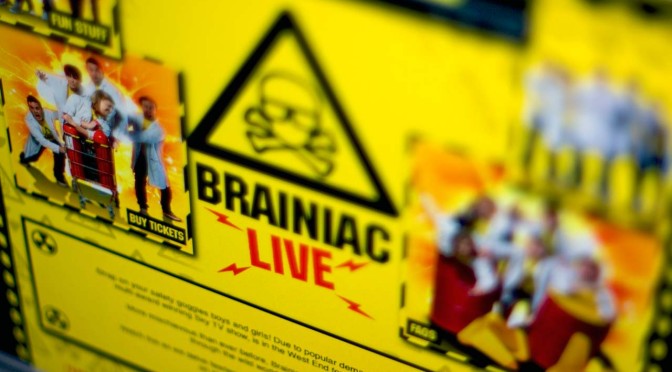What kind of example is set by the organisers of the largest STEM engagement event in the UK when they book Brainiac Live – Science Abuse as a headline show? What possessed STEMNET and the ASE to think that collaborating in a ticket promotion of Brainiac Live’s recent West End debut was a good idea?
Faked demonstrations. Mistakes in basic science. A disregard for copycat risks. A counter-productive desperation to ‘make science fun’. A profound lack of passion for science. Are these really qualities with which these organisations want to associate themselves?
Faking your results is the very antithesis of science demonstration shows and, in fact, science. Also, if you fake demos, the damaging subtext is that science isn’t interesting enough in itself, so it has to be enhanced by trickery. The rocket-powered spinning chair routine is symptomatic of most of what is wrong with Brainiac Live and its choice as a headline act for the Big Bang Fair:
Incredibly, it is claimed that the stage pyro “rockets” create the additional thrust rather than the fact that the performer is firing the extinguisher almost continuously on the second occasion! This could have been a high-impact demo with strong theatrical production values and good audience interaction. However, it is completely compromised by a shameful disregard for the science and a preference to trick the audience with a stage firework. It’s so frustrating – a single line at the end of the routine, humorously acknowledging the real role of the “rockets”, could have saved it entirely. This has been pointed out to them. But they don’t seem to care.
The biggest irony of Brainiac Live being booked or promoted by STEM engagement organisations is that it is self-evidently written and performed by people who refuse to believe that science is interesting. This is a capital crime in science communication.
I despair at seeing the wonderful art and science behind science demonstrations being exploited by a theatre production company who do not seem to care about either. There are many passionate, knowledgeable, professional science demonstrators in the UK for whom this caricature of science communication is ludicrous.
I’ve written an open letter of concern explaining my criticisms in more detail. If you share any of these concerns, I urge you to express them to the STEM engagement organisations which book or promote this show.


